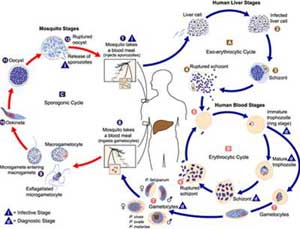 |
|
Lifecycle of Malaria |
Malaria is a disease that is rarely transmitted from person to person, from mother to child, or through blood transfusions, organ transplants, or sharing needles. It is primarily spread through the bite of mosquitoes that have previously bitten an infected person.
Signs and Symptoms
A child infected with malaria may initially show symptoms such as irritability, lethargy, poor appetite, and sleep disturbances. Following these initial symptoms, chills may occur, followed by fever and rapid breathing. The fever can gradually rise over 1 to 2 days or spike suddenly to 105 degrees Fahrenheit (40.5 degrees Celsius) or higher. As the fever subsides and body temperature quickly returns to normal, the child begins to sweat profusely.
Symptoms like chills, fever, and sweating may recur over a span of 2 to 3 days, depending on the species of malaria parasite causing the illness. Due to the initial symptoms often being vague and easily confused with other illnesses, malaria can be challenging to diagnose.
Other symptoms of malaria include headaches, nausea, general body aches, particularly in the abdomen and back, and an enlarged spleen. When malaria affects the brain, a child may experience seizures or coma. If malaria impacts the kidneys, there may be an unusually low production of urea.
Globally, between 300 to 500 million people are infected with malaria each year. Most cases occur in the sub-Saharan region of Africa, with about 2 million people dying each year from malaria.
When malaria parasites enter the bloodstream, they travel to the liver, where they multiply rapidly. Every few days, thousands of parasites are released from the liver into the blood, where they destroy red blood cells. Some parasites remain in the liver, continuing to multiply and releasing more parasites into the blood every few days.
The incubation period for malaria is the time from when a mosquito bites until the parasites are released from the liver. This period varies depending on the type of malaria parasite causing the disease. Generally, it ranges from 10 days to 1 month.
Preventing Malaria
Healthcare experts aim to prevent malaria through mosquito control programs designed to kill mosquitoes, the vectors that spread the disease. If traveling to areas with high rates of malaria, you should install window screens, use insect repellent, and sleep under mosquito nets.
Consult with a doctor before visiting tropical or subtropical regions with a high risk of malaria, as you may be prescribed antimalarial medication to prevent the disease.
Currently, several malaria vaccines are being researched and tested worldwide, but due to the various stages in the life cycle of the malaria parasite, developing these vaccines has been quite challenging. Therefore, the best way to prevent malaria remains avoiding mosquito bites.
T.VY
















































